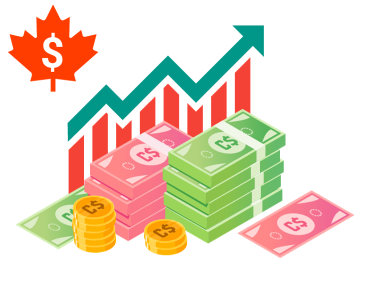For travellers and investors looking to navigate the Canadian Dollar to JPY exchange rate, understanding the basics of currency exchange rates and the factors that affect them is crucial. The history of the Canadian Dollar and JPY exchange rate, current trends and predictions, and tips for getting the best deal when converting CAD to JPY are also important considerations. Additionally, for those travelling to Japan, knowing how to use CAD and JPY in the country can save both time and money. For investors, there are opportunities and risks associated with investing in CAD and JPY. This article will explore all of these topics and provide valuable insights for anyone interested in the Canadian Dollar to JPY exchange rate.
The Basics of Currency Exchange Rates
Currency exchange rates are the value of one currency in relation to another. They determine the price at which one currency can be exchanged for another. For example, if the Canadian dollar to JPY exchange rate is 80, it means that one Canadian dollar is worth 80 Japanese yen. Exchange rates are constantly changing due to various economic and political factors. The most common exchange rate systems are floating exchange rates and fixed exchange rates. In a floating exchange rate system, the exchange rate is determined by the supply and demand of the currencies in the foreign exchange market. This means that the exchange rate can fluctuate frequently based on market conditions. In contrast, in a fixed exchange rate system, the government or central bank sets a specific value for the currency, which remains relatively stable over time. Understanding currency exchange rates is important for travellers and investors alike. Travellers need to know how much their money is worth in foreign countries, while investors need to monitor exchange rates when investing in foreign markets. Overall, currency exchange rates are a crucial aspect of global economics and play a significant role in international trade and finance.
Factors That Affect the Canadian Dollar to JPY Exchange Rate
Several factors affect the Canadian Dollar to JPY exchange rate, including economic performance, political stability, and monetary policy. The strength of Canada’s economy and its trade relations with Japan can influence the exchange rate. For example, if Canada’s economy is doing well, investors may want to buy Canadian dollars, increasing demand and driving up the exchange rate. Political stability is also a crucial factor since uncertainty can cause investors to pull out of a currency. Monetary policy decisions by central banks also impact the exchange rate. For instance, if the Bank of Canada raises interest rates, it can attract foreign investors who seek higher returns, increasing demand for the Canadian dollar and raising its value relative to the Japanese yen. On the other hand, if Japan’s central bank increases its money supply, it can decrease the value of the yen relative to other currencies. Other factors that can impact the Canadian dollar to JPY exchange rate include commodity prices, inflation rates, and global economic events such as natural disasters or geopolitical tensions. Understanding these factors can help travellers and investors make informed decisions when converting CAD to JPY or investing in these currencies.
The History of the Canadian Dollar and JPY Exchange Rate
The Canadian dollar and JPY exchange rate has a long history dating back to the early 20th century. In 1914, Japan and Canada established formal diplomatic relations, and this marked the beginning of trade between the two countries. However, it wasn’t until the mid-1950s that the Japanese yen became a significant currency in international trade. At this time, Canada was also establishing itself as a major player in global trade, and the Canadian dollar was gaining strength against other currencies.
During the 1970s, both Japan and Canada experienced economic growth, and their currencies were viewed as stable and reliable. This led to increased trade between the two countries, which further strengthened their economic ties. By the 1980s, the Canadian dollar was trading at an all-time high against the Japanese yen due to Canada’s strong economy and exports of natural resources such as oil and lumber.
However, the 1990s saw a decline in the value of both currencies due to various economic factors. The Japanese economy suffered from a period of deflation and low growth, while Canada’s economy was hit by a recession in the early 1990s. This led to a weakening of the Canadian dollar against the Japanese yen.
In recent years, the Canadian dollar has generally remained weaker than the Japanese yen. This is due to factors such as lower interest rates in Canada compared to Japan, as well as fluctuations in global commodity prices that impact Canada’s economy. Despite this, trade between Japan and Canada continues to be strong, with both countries benefiting from their economic partnership.
Current Trends and Predictions for the Canadian Dollar to JPY Exchange Rate
The Canadian Dollar to JPY exchange rate has experienced some volatility in recent years. In 2018, the CAD to JPY rate was relatively stable, with an average exchange rate of around 85 JPY for one Canadian dollar. However, in 2019, the CAD to JPY exchange rate started to weaken due to a variety of factors, including a slowdown in the global economy and trade tensions between the US and China. The COVID-19 pandemic further exacerbated this trend, with the CAD to JPY exchange rate falling to around 72 JPY for one Canadian dollar in March 2020. Since then, the exchange rate has recovered somewhat, with the CAD to JPY rate hovering around 80 JPY for one Canadian dollar as of late 2021.
Looking ahead, there are several factors that could impact the CAD to JPY exchange rate. One key factor is the ongoing pandemic and its impact on the global economy. If there is a sustained economic recovery, this could lead to increased demand for Canadian goods and services, which could strengthen the Canadian dollar relative to the yen. Another factor is the Bank of Canada’s monetary policy decisions. If the Bank of Canada raises interest rates, this could make Canadian assets more attractive to investors, leading to a stronger Canadian dollar.
Overall, while there is some uncertainty around future exchange rate movements, it seems likely that the CAD to JPY exchange rate will remain relatively stable in the near term, barring any major economic or geopolitical shocks. Travellers and investors should keep an eye on these trends and consult with financial experts before making any significant currency transactions.
How to Get the Best Deal When Converting CAD to JPY
When converting CAD to JPY, it is essential to get the best deal possible. The first step is to compare exchange rates from different sources, such as banks, exchange bureaus, and online currency exchange platforms. Look for the best rate available and avoid places that charge high fees or commissions. Another way to save money is by avoiding exchanging money at airports, as their rates tend to be much higher than other places. It’s also important to keep in mind that some credit cards offer favourable exchange rates when used abroad. Before travelling, check with your bank to see if they have any partnerships with international banks that allow for fee-free withdrawals or reduced transaction fees. When converting a large sum of money, it might be worth considering a forward contract, which allows you to lock in an exchange rate in advance for a future transaction. This can help protect you from fluctuations in the exchange rate. However, this option should only be considered if you are confident that the rate will not improve before your transaction takes place. Lastly, it’s important to keep an eye on current events and economic trends that could impact the exchange rate. By monitoring these factors, you may be able to predict when it’s the best time to convert CAD to JPY and get the most value for your money.
Tips for Travellers: Using CAD and JPY in Japan
Travelling to Japan can be an exciting adventure, but it is important to understand how to use the Canadian Dollar and Japanese Yen in the country. Firstly, it is essential to exchange CAD for JPY before arriving in Japan as not many places accept foreign currency. ATMs are widely available in Japan, but it is advisable to check with your bank about any international transaction fees that may apply. Secondly, credit cards are widely accepted in large cities like Tokyo and Osaka, but it is always wise to carry some cash for smaller purchases or when travelling to rural areas. Thirdly, when using cash, be prepared to use coins as they are more commonly used than notes in Japan. It is also customary to present cash with both hands when making a purchase. Additionally, it is important to note that tipping is not customary in Japan and may even be considered rude. Lastly, it is useful to learn basic Japanese phrases for money transactions such as “ikura desu ka?” which means “how much is it?” and “arigato gozaimasu” which means “thank you very much”. Overall, by being prepared with local currency, knowing where and when to use credit cards, carrying coins for smaller purchases and understanding local customs around money transactions, travellers can have a more enjoyable experience when using CAD and JPY in Japan.
Investing in CAD and JPY: Opportunities and Risks
Investing in CAD and JPY can provide opportunities for investors to diversify their portfolios and potentially earn profits. One way to invest in these currencies is through exchange-traded funds (ETFs) that track the performance of the CAD and JPY against other currencies or a basket of currencies. These ETFs provide investors with exposure to the currency markets without having to buy and sell individual currencies. However, investing in currency ETFs can also come with risks, including fluctuations in exchange rates, geopolitical events, and economic conditions. Additionally, investors should be aware of the fees associated with currency ETFs, which can impact their returns. Another way to invest in CAD and JPY is through stocks or bonds issued by companies or governments in Canada or Japan. This can provide exposure to the local economy and potentially generate income through dividends or interest payments. However, investing in individual stocks or bonds comes with its own set of risks, including company-specific factors and changes in the overall market conditions. It is important for investors to carefully consider their risk tolerance, investment goals, and do their due diligence before investing in CAD and JPY or any other currency.
Understanding the Canadian dollar to JPY exchange rate is essential for travellers and investors alike. By knowing the basics of currency exchange rates and the factors that affect them, you can make informed decisions about converting CAD to JPY and vice versa. The history and current trends of the exchange rate provide valuable insights into its fluctuations, while tips for getting the best deal and using CAD and JPY in Japan can help you save money during your travels. Investing in CAD and JPY can be a great opportunity, but it also comes with risks that must be carefully considered. As you navigate the world of currency exchange rates, keep in mind that they are constantly changing and influenced by a variety of factors. Reflect on how these fluctuations may impact your future travels or investments, and stay informed to make the most out of your money.






Leave a Reply